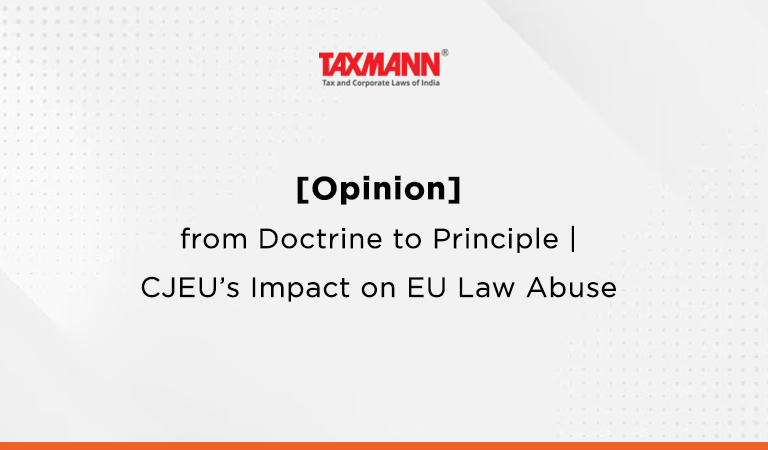[Opinion] from Doctrine to Principle | CJEU’s Impact on EU Law Abuse
- Blog|News|International Tax|
- 3 Min Read
- By Taxmann
- |
- Last Updated on 28 April, 2023

Rishabh Agarwal – [2023] 149 taxmann.com 353 (Article)
1. Introduction
This paper will primarily deal with the effects of the CJEU judgements which held that the ‘prohibition of abuse of EU law’ is a ‘general principle of EU law’. This general principle extends to both the primary and the secondary EU law. This paper also analyses key judgements made by the CJEU and how the concept of abuse of law has been transformed from a doctrine to a general principle of EU law. On the one hand, the taxpayers can set up their businesses in such a way that their tax burden is minimized i.e. the choice of the least taxed road. On the other hand, the right to utilize the internal market does not protect the taxpayer who attempts to pay less tax by artificially falling within the scope of the basic freedoms or secondary EU legislation. People who rely on EU legislation in an incorrect way are not protected by it. In other words, the prohibition of abuse is interpreted as meaning that the right or benefit offered by EU law and claimed by a taxpayer is excluded only when the relevant economic activity carried out has no other objective explanation than to artificially create such a right and recognition of that right would have a negative impact on legitimate trade. Thus, the member states are free to enact measures that restrict the protection of the benefits obtained subject to the proportionality and necessity assessment.
2. Timeline
The abuse of the EU law doctrine was first coined in the case of Emsland-Stärke which was related to agricultural levies, a two-prong test of abuse was developed in the above case. The test requires an objective and a subjective element to assess whether there is abusive behaviour. The objective test necessitates objective circumstances in which it seems that the intended goal of EU legislation has not been met notwithstanding strict adherence to the language of the law. The subjective test requires that the ultimate intention of the arrangement set in place by the economic operator is to obtain the advantage from the EU rules, which can be deduced from the artificiality of the arrangement and evaluated in light of objective factors. In other words, a combination of objective and subjective circumstances helps to establish that an economic operator intends to obtain a benefit under the EU law by setting up an artificial arrangement that observes the letter of EU law and not the spirit if that benefit is granted.
Further, in the Halifax case, the CJEU ruled about the abuse of EU law in a VAT case and also applied a test similar to the two-prong test of the Emsland-Stärke case. In the above case the court held that, in the case of VAT, it appears that an abusive practice exists only if, first, the transactions in question result in the accrual of a tax advantage that would be contrary to the purpose of the relevant provisions of the Sixth Directive and the national legislation transposing it, despite the formal fulfillment of the conditions laid down by the relevant provisions of the Sixth Directive and the national legislation transposing it. Second, a number of objective criteria must indicate that the primary goal of the transactions in question is to get a tax benefit. Also, if the economic activity has purposes other than just obtaining tax advantage then the prohibition of abuse is not relevant.
Click Here To Read The Full Article
Disclaimer: The content/information published on the website is only for general information of the user and shall not be construed as legal advice. While the Taxmann has exercised reasonable efforts to ensure the veracity of information/content published, Taxmann shall be under no liability in any manner whatsoever for incorrect information, if any.

Taxmann Publications has a dedicated in-house Research & Editorial Team. This team consists of a team of Chartered Accountants, Company Secretaries, and Lawyers. This team works under the guidance and supervision of editor-in-chief Mr Rakesh Bhargava.
The Research and Editorial Team is responsible for developing reliable and accurate content for the readers. The team follows the six-sigma approach to achieve the benchmark of zero error in its publications and research platforms. The team ensures that the following publication guidelines are thoroughly followed while developing the content:
- The statutory material is obtained only from the authorized and reliable sources
- All the latest developments in the judicial and legislative fields are covered
- Prepare the analytical write-ups on current, controversial, and important issues to help the readers to understand the concept and its implications
- Every content published by Taxmann is complete, accurate and lucid
- All evidence-based statements are supported with proper reference to Section, Circular No., Notification No. or citations
- The golden rules of grammar, style and consistency are thoroughly followed
- Font and size that’s easy to read and remain consistent across all imprint and digital publications are applied



 CA | CS | CMA
CA | CS | CMA
